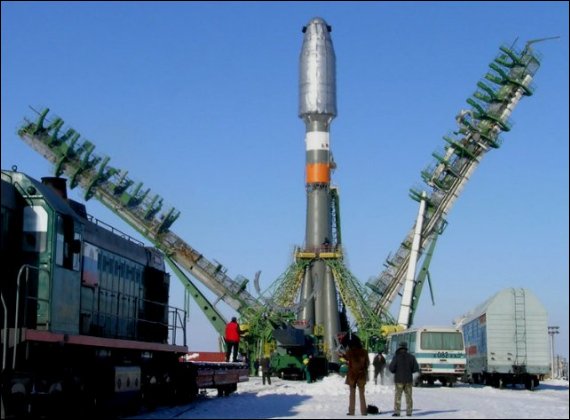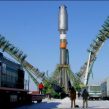
Russia Threatens to Suspend Space Cooperation with Kazakhstan over Baikonur Dispute
Publication: Eurasia Daily Monitor Volume: 10 Issue: 18
By:

Hours before Kazakhstan’s newly appointed Foreign Minister Erlan Idrissov started his first official visit to the Russian Federation, one of Russia’s daily newspapers reported that the country’s foreign ministry had addressed a diplomatic note to its Kazakhstani counterpart with regard to the issue of the Baikonur Cosmodrome. Interestingly, the text of this note was said to have been couched in quite undiplomatic language, with Russia expressing its surprise and annoyance at Kazakhstan’s recent decision to scale down the frequency of rocket launches from Baikonur in 2013 (Izvestia.ru, January 24).
On December 28, 2012, Kazakhstan’s National Space Agency unveiled its working program for the upcoming year, including the official schedule of Russian-operated rocket launches under the bilateral lease agreement, which currently runs through 2050 (initially concluded in 1994, it was extended ten years later by Vladimir Putin and Nursultan Nazarbayev). While Russian authorities had previously insisted on 17 launches of “Proton” rockets, the most frequently used model of launch vehicles, Kazakhstan agreed to authorize only 12 of them, citing potential environmental damage. Moreover, Kazakhstani space experts decided to link the further use of “Soyuz”-type rockets with the existence of a separate technical agreement providing the exact location of drop zones on Kazakhstan’s territory (Vesti.ru, January 18).
According to Russian government sources, such a reduction in launches, as well as additional legal requirements already envisaged by the neighboring country, could compromise Russia’s commercial obligations. For instance, its inability to launch all of the 17 rockets during the course of 2013 might practically lead to the unilateral termination of several lucrative contracts and the payment of damages worth over $500 million to Russia’s foreign clients. “Russia considers this decision as an attempt by Kazakhstani authorities to bypass the terms of their lease agreement concerning the site of Baikonur, namely their obligation ‘not to prevent the leaseholder, directly or indirectly, from using the leased property for an intended purpose,’” reads the Russian foreign ministry’s statement (Lenta.ru, January 24; Utro.ru, January 24).
Apart from claiming indemnification against potentially incurred losses, Russia also threatened to discontinue cooperation with Kazakhstan under all the ongoing space projects, including the ambitious “Baiterek” program, whose start had been agreed back in 2004 but was delayed several times due to a lack of consensus on the financial aspects of the issue. Last year, Kazakhstan’s National Space Agency deplored the fact that the overall cost of the program, estimated at $700 million only two years ago, had mysteriously climbed to $1.6 billion, with Moscow refusing to sponsor the phase of construction and proposing to use a part of its lease payment to the Kazakhstani government as Russia’s funding. While no progress has been achieved since 2004—and the essential infrastructure still present only on paper—the Kremlin is more inclined to use its state-of-the-art “Angara” launch vehicles at its new Vostochny Cosmodrome near the Russian-Chinese border. Currently, the first launch from Russia’s Far East is scheduled for 2015 (see EDM, October 24, 2012).
Earlier, on December 10, 2012, Talgat Musabayev, the head of Kazakhstan’s space authority, told the country’s parliament that the 1994 agreement with Moscow needed to be drastically revised in order to account for the technological and legal changes of the last 15 years. He also hinted at a possibility of modifying the terms of lease, starting with the transfer of Baikonur’s right wing, which contains the launch site for “Zenit” rockets, to Kazakhstan’s direct supervision, as well as the withdrawal of the whole town of Baikonur from Moscow’s jurisdiction. Furthermore, Musabayev insisted that the frequency of launches of “Proton” rockets be reduced from year to year, although Russia had previously upgraded the rocket to a new version called “Proton-M,” which is considered to be more environmentally friendly than all the earlier prototypes. While Moscow requested formal explanations following Musabayev’s controversial speech before the deputies, Kazakhstani representatives of the intergovernmental commission in charge of space cooperation downplayed his statement, referring to the absence of any major stumbling blocks in the Russian-Kazakhstani space dialogue (Zakon.kz, December 11, 2012).
“Kazakhstan is always interested in participating in the activities of the Baikonur Cosmodrome with a view to developing its own space potential. In this regard, it would be incorrect on our behalf to miss any opportunity of cooperation with such an important player in the world space industry as the Russian Federation,” said Kazakhstan’s foreign ministry in late December. It further mentioned the results of the December 19, 2012, meeting between Presidents Putin and Nazarbayev in Moscow where both leaders had hailed Baikonur as a successful example of bilateral cooperation. During their first official meeting in the Russian capital on January 24, 2013, Foreign Ministers Lavrov and Idrissov advised both journalists and industry professionals to avoid any temptations to politicize the issue of Baikonur, whose future would be entirely determined by way of a continued dialogue within the intergovernmental commission (Kommersant.ru, January 26; Kursiv.kz, December 19, 2012).
Erlan Idrissov even added: “Nobody can embroil Kazakhstan and Russia in a quarrel. Baikonur is our common heritage that only augments both our countries’ dividends.” Despite these protestations of good will, a source close to the Russian government recently confirmed in his interview with Interfax that Musabayev had promised his inner circle to continue to use the issue of rocket launches as a way to blackmail Russia into being more cooperative, lest Baikonur completely drift out of Moscow’s control (Kommersant.ru, January 26; Forbes.ru, January 18).




